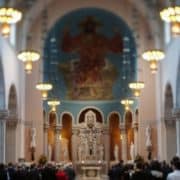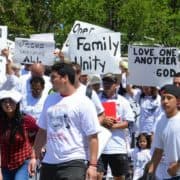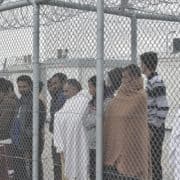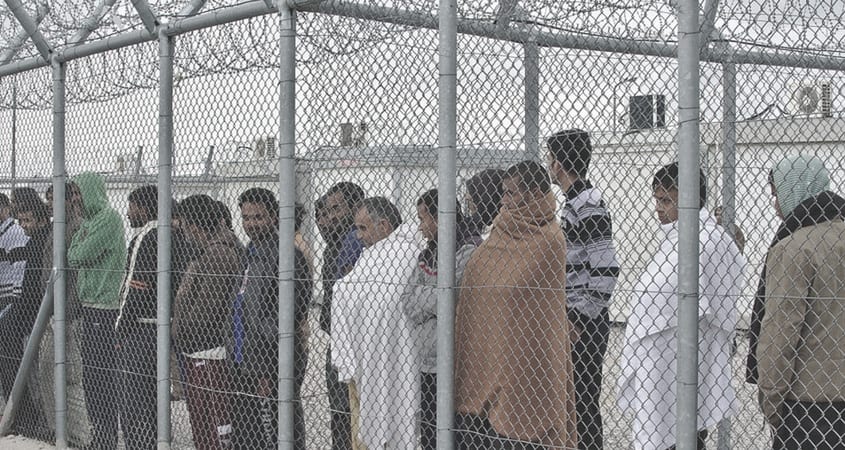BY ISN STAFF | April 3, 2017
On March 27, St. Thomas More Catholic Community in St. Paul, Minnesota became the second Jesuit parish in the United States to designate itself a Sanctuary Parish, following St. Agnes Church in San Francisco in January of 2017. “We declare,” reads the parish statement, “that undocumented persons in our community deserve to be treated with respect, dignity, and justice.”
The Catholic Church, Pope Francis, and the Society of Jesus have long advocated for immigration reform in the U.S. St. Thomas More and its predecessor parishes, Immaculate Heart of Mary and St. Luke’s, have a lengthy history of working with undocumented persons as advocates and supporters. St. Thomas More engaged in an extensive discernment process to determine how the parish can today’s immigrant population in the Twin Cities and nationally.

St. Thomas More Catholic Community in St. Paul, MN officially designated itself a sanctuary parish on March 27.
As part of St. Thomas More’s discernment process, the parish held three discernment sessions open to all community members, established four working groups to research answers to questions raised in these sessions, provided a draft statement on sanctuary to parishioners and an opportunity to comment, and discussed the research and parish feedback with parish leadership. Many themes emerged.
The community acknowledges and respects the federal government’s obligation to protect borders and uphold U.S. immigration laws. “Nevertheless,” reads the parish statement, “we agree with the U.S. Catholic Bishops Conference that immigration principles should always be at the service of human dignity and the common good of society. St. Thomas More is committed to increasing its advocacy for just and humane immigration reform at both the local and national level.”
As a sanctuary parish, St. Thomas More commits to advocating for justice for immigrants on both a local and national level; offering spaces for organizers, lawyers, and community members to meet; listening and responding to the call and needs of immigrant brothers and sisters; gathering for communal prayer to continually discern the movement of the Spirit in the parish community’s work, action, and lives; and developing a robust referral program to put those asking for help and guidance in contact with local agencies able to provide that help and guidance.
As part of the discernment process, it was clear to parish leadership that a majority of the responders in feel called to participate in more immediate, collective action than advocacy alone can provide. Many feel a biblical and theological call to act like the Good Samaritan who provided shelter, financial support, and comfort to a stranger in need or the innkeeper who offered Mary and Joseph a place to rest after a long journey.
St. Thomas More will support a sanctuary effort by opening space within the Parish Center for individuals facing deportation, especially where deportation would separate parents from their children or would separate people brought to the United States as children from the only homes they have ever truly known. The parish will also create an Implementation Team that will devise a plan for safely welcoming undocumented persons into the community and communal spaces; marshal independent financial resources to the extent possible to support the sanctuary effort; provide training for staff and volunteers on best practices for safely and lawfully welcoming undocumented persons into the community; and work with parish leadership to minimize insurance, financial, and legal risks to the parish community.
“We believe that our efforts are a calling of our faith and a reflection of who we are as a Jesuit parish,” reads the statement. “We respect all parishioners’ right to participate in advocacy and sanctuary efforts to the degree their personal discernments dictate.”
Upon announcement of the parish’s sanctuary decision, Fr. Warren Sazama, S.J., St. Thomas More pastor, shared reflections from parishioners who had spoken and acted in support of the decision, emphasizing the faith and justice dimensions of the action. One young parishioner shared:
“I was a part of the growing statistic of young Americans who identify as spiritual but not religious. Before my husband and I came to STM two years ago, my image of the Church was tainted by nodes of scandal, exclusivity, and patriarchy. Then I got to know the STM community. STM began to transform my image of the Church to a good, compassionate, welcoming one. I started to talk about my church (as a millennial! gasp!) with my non-religious classmates (I’m in business school) and friends. I started to defend my Catholic faith. Then, I did something unexpected: I decided to go through the RCIA process at STM to discern becoming a confirmed Catholic. I’ve felt let down by the Catholic Church many times, but the prospect of STM serving as a sanctuary parish has restored a lively faith in me: I’m ready to engage, give, help however I can. I’m not a lifelong parishioner (yet), but I can tell you: sanctuary won’t divide this parish. Sanctuary is who this parish is.”
Editor’s Note: This piece was originally published as part of the Ignatian Solidarity Network News From the Network series.





